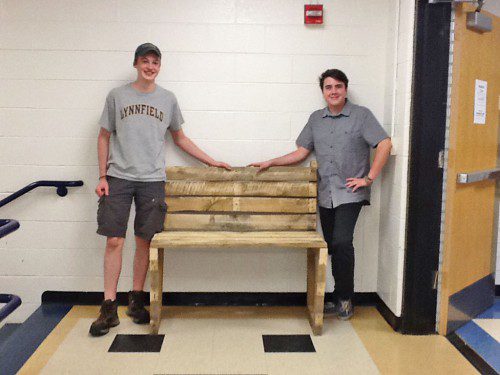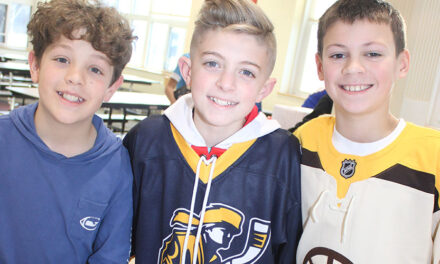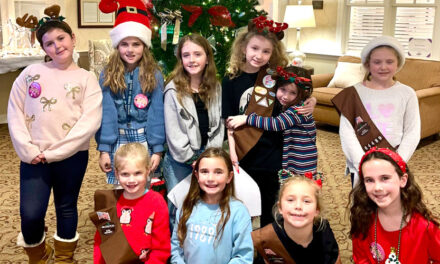Published in the June 17, 2015 edition

LHS JUNIORS Nick Miller (left) and Chris Bartolotta proudly display a bench they built out of pallets in Scott Gordon’s environmental science and sustainability college prep class. (Courtesy Photo)
By DAN TOMASELLO
LYNNFIELD — Lynnfield High School students have been learning how to be environmentally conscious in innovative new ways this year.
The high school introduced the environmental science and sustainability college prep class earlier this year for juniors and seniors, which is taught by science department head Scott Gordon. The laboratory-based science course is designed for students who want to learn the scientific principles behind the environment and teaches ways society can be more sustainable.
“It’s an experientially-based, project-based science course,” said Gordon. “Through the projects students perform, whether using the 16 raised bed organic gardens we have or heading in some other direction, students link to various scientific principles in a multidisciplinary approach. We’ve set the bar very high for this class and have had a really positive experience in our first year.”
Gordon said the course’s origins date back three or four years when he built two garden beds behind LHS. The high school now has 16 organic gardens growing behind the high school, which has been largely funded by grants.
While the course grew from the seeds of a vegetable garden, Gordon said the environmental science class is designed to teach students a variety of different skills by linking science, research, writing and business together.
“The goal for this course is multileveled,” said Gordon. “I am trying to take this course into the future of where we are headed educationally, where we are headed as a society and where we are headed as a planet. We have to be sustainable with how we do things moving forward.”
Gardens
As part of the new environmental science course, students have been learning how to grow vegetables. Students were able to grow spinach and kale over the winter. Gordon said students studied the growing practices of Maine farmer Eliot Coleman about how to extend the growing season.
According to Gordon, students created a hoop house out of PVC pipe and plastic sheeting, which were closed in and bedded down.
“It acts like a mini greenhouse and the plants heat up whenever the sun is out,” said Gordon. “There were a lot of days where it was in the 20s outside and it was 65 or 70 in the hoop house. The spinach and kale love those temperatures.”
According to Gordon, the Lynnfield Curriculum Council has purchased a greenhouse for the garden next year. He said the greenhouse will be placed over the hoop houses, which will accelerate the growing season.
“I am looking forward to going out there in snowshoes and picking vegetables in January,” said Gordon.
In addition to spinach and kale, Gordon said students have been growing garlic, two different varieties of romaine lettuce, buttercrunch lettuce, arugula, mâché, tatsoi and tomatoes.
“One of the things I am most proud of is we have grown over 200 tomato plants from seeds that we isolated ourselves from our own tomato plants we grew last year,” said Gordon. “They are all organic cherry tomatoes.”
While studying how to grow tomatoes, Gordon said students learned how to isolate tomato seeds, which he said is more cost effective than purchasing seeds from a distributor.
“We were able to isolate about $370 worth of seeds,” said Gordon. “We are not going to have to buy tomato seeds for a long time.”
According to Gordon, students placed the tomato plants into five gallon buckets that were donated by restaurants and some parents. He also said students collected sticks off the ground to serve as stakes.
“We are trying to use the resources that are around and we are trying to take things out of the waste stream,” said Gordon.
Additional projects
As part of the environmental science and sustainability class, Gordon said students are undertaking a variety of different projects while learning how to reuse different things.
“I am not teaching students the same thing,” said Gordon. “I am having students do projects that they would be doing in a PhD program. They are doing research, running with it and creating a project.”
One of the projects students undertook is the candle project, where students created new candles out of leftover wax from candles that have already been used. According to Gordon, students brought in old candles and the remaining wax at the bottom of the jars was melted down with a wax melter. After certain materials were discarded, the wax was poured into baking pans and wax bricks were created.
“The only thing new in the candles are the wicks,” said Gordon.
In the past, Gordon said students raised quite a bit of money for charitable organizations by selling revitalized candles.
Gordon said some students built planter boxes out of pallets. He said the students who built the planter boxes ended up selling them at GeraniumFest and made over $100.
“They took pallets they got from the Dumpster and made very rustic looking planter boxes,” said Gordon. “They look like they could be sold in a store.”
Gordon said juniors Nick Miller and Chris Bartolotta a built bench out of pallets.
“They took the pallets apart, took the nails out, recycled the nails and saved all of the good boards,” said Gordon.
Another student has been studying the negative affects of plastic water bottles as part of an initiative to move the high school away from bottled water. According to Gordon, the student has convinced the high school and LHS PTO to install a water filtration system on one of the water fountains in the cafeteria. He said the water filtration system will be cheaper than buying bottled water.
“The PTO donates between $600 and $800 every year to buy bottled water,” said Gordon. “If you put in one of these filtration stations for $1,500, it solves the problem. You just need to change the filter once in awhile.”
A couple of students also built a tumbling composter made of reused materials such as old timbers and a 40-gallon drum.
A female student undertook a project where she gave Huckleberry Hill students a Lynnfield tree lesson as well as teach students how to make pine comb bird feeders.
“The feedback was fantastic,” said Gordon. “She loved it, the kids loved and the teachers loved it.”
A group of students also built a solar weather purifier. Gordon said the purifier uses sunlight similar to a solar water heater, which evaporates the water, deposits the water’s impurities in a pan and clean water comes out of a spigot.
“It’s going to be sent to a village in Mexico where people have trouble accessing clean water,” said Gordon.
Students also created biobricks out of recycled paper, which were created with a $50 press from Germany. The bricks are going to be donated to a camp in the White Mountains.
Gordon said all of the projects will be presented at a class fair on Friday, June 19.
The big picture
Gordon said the projects students are undertaking are designed to teach students environmental lessons as well as “skills that will be useful in their lives.”
“We are supported by the air that we breathe, the water we drink and the food that we grow in our soil,” said Gordon. “If we poison those things or don’t take care of them, that affects human health. Human health is intricately linked to the health of the planet.”
Gordon said the environmental science has caught fire with students. After teaching one class with 24 students this year, he said he will be teaching two sections that will have over 40 students enrolled next year.
“It’s gone great after the first year,” said Gordon.




